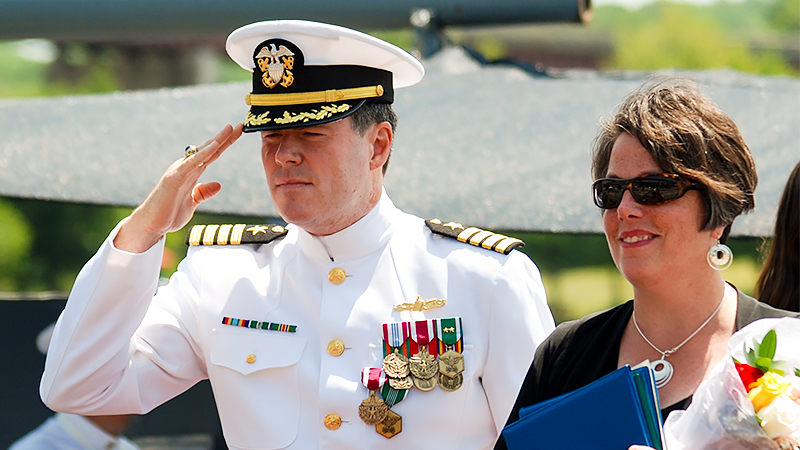On the surface, a career in the Navy and a career in banking seem vastly different, but for Mike Nevins, the two couldn't be more aligned. After a successful stint in the Navy, Mike transitioned into the corporate world and soon learned the key lessons of his military career—work with integrity, honor your values, care for your community and serve the public—are relevant whether he's in uniform or not.
What originally motivated you to enlist in the Navy?
I was recruited by the Naval Academy to play baseball. My dad served in the Army, but we didn't have a longstanding family tradition of military service. After visiting the Naval Academy, I realized it was a special place, and the rest is history.
Like many other students, I initially wanted to fly planes. Top Gun was out at that time, and everybody wanted to be Tom Cruise. Unfortunately, I failed my flight physical because I didn't have 20/20 vision. I ultimately became a Surface Warfare Officer and spent my time in active duty at sea. It ended up being a tremendous experience for me.
What lessons did the Navy instill in you that support your career out of uniform?
The leadership skills you develop in the service apply directly to what we do in Commercial Banking. The service taught me the importance of taking care of your people. The mental health and physical well-being of my team and their families is a primary concern of mine.
Another lesson I carry with me is that values matter. I was attracted to this company because our values are so strong. It's a very close alignment to what I experienced in the Navy.
Finally, integrity matters—personal and institutional integrity. The Navy teaches you to treat everyone with dignity and respect. I find the application of these lessons to be very direct because they matter here as much as they did in the service.
Was it difficult transitioning from military service to civilian life?
I think the key to a successful transition is balance. The Navy teaches you to think of life as a three-legged stool, and it requires balance to navigate your service, your corporate life and your personal life. I think the same is true for all of us. When one area of life is off kilter, something will suffer. Keeping this in mind helps me stay grounded and helped me through my transition to civilian life.
What advice would you give a fellow veteran transitioning into a corporate career?
The idea of serving something bigger than yourself has stayed with me. In fact, I'm still motivated by it every day. I look at the business I'm fortunate enough to run, Government Banking, and it's filled with people who not only have an affinity for service, but also love it. They have a deep connection to serving the public, and our communities—both of which JPMorganChase values greatly.
There are intangible benefits from this connection to your work, so my advice to a service member is to find work that you believe in. If you do that and then apply the motivation that you honed in the service, you'll find joy. For me, it's been absolutely incredible.
Can you tell us about a great leader you've worked for or learned from? What made them great?
I've been fortunate to work with and for exceptional leaders both in the service and in commercial banking. JPMorgan Chase leaders share so many characteristics with some of the best people I worked for in the service. They lead from the front, they set the example, and they're always thinking ahead. They bring those characteristics to work every single day, and I admire it.
You've been at JPMorganChase for nearly 20 years. What keeps you here?
It's simple, I love what I do. I love the business, the people and the mission. What we do in Government Banking to serve the public is super important to me, and I get great motivation from that. I'm fortunate to have a team that feels the same way I do.




